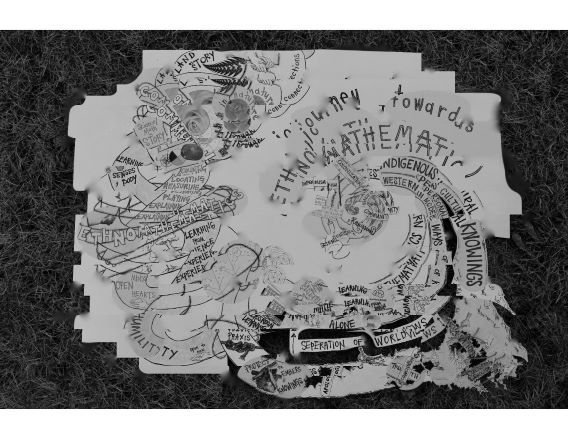Circling the square: Indigenizing the Dissertation
Abstract
Abstract:
Through tradition and standardization, the structure of the dissertation template has ‘boxed in’ a colonial standard whilst ‘cornering’ ways of knowing that cannot be expressed within these limits. But within these corners ideas huddle desperately together, preserving valuable embers of knowledge, conserving strength to ignite a fire to round these corners to closer resemble a circle, forcing dialogue between disparate world-views (Ermine, 2007).
The Doctoral Forum at the Queensland University of Technology [QUT] in Australia brought together an Aboriginal PhD candidate from Australia and an Indigenous PhD candidate from Canada. Discussion about the limitations of the standard dissertation format arose. While researching in diverse disciplines, we found we shared experiences of constraint and a kind of tug-of-war to address the requirements of the institution while privileging our positionality and standpoint as Indigenous peoples; speaking back to the dominant voices of the coloniser. We reflected on how the template acted to privilege Western institutional constructs and how dominant colonial structures suppress land-based methodologies, creativity, and holism.
Through our critical dialogues, we recognise that to morph the ‘square’ of standardization, we must nourish an openness towards multiple ways of knowing and doing through a delicate balance of decolonizing and Indigenizing (Pratt, Louis, Hanson & Ottmann, 2018). This paper will address how these two grad students are blurring the boundaries of the standardized dissertation structure. Through critical dialogue, the colonial structures that ‘box’ us in, providing a means for the previously cornered and marginalized voices to be heard.
References
Adams, J., Luitel, B. C., Afonso, E., & P.C. Taylor. (2008). A cogenerative inquiry using postcolonial theory to envisage culturally inclusive science education. Cultural Studies of Science Education, 3(4), 999-1019.
Aikenhead, G. S. (2017). School mathematics for reconciliation: A 21st Century economic, educational and ethical mathematics curriculum policy. University of Saskatchewan. https://www.usask.ca/education/documents/profiles/aikenhead/School-Mathematics-for-Reconciliation-vB11.pdf.
Archibald, J. Q’um Q’um Xiiem (2008). Indigenous storywork: Educating the heart, mind, body,
and spirit. Vancouver, BC: UBC Press.
Bateson, G. (1972). Steps to an ecology of mind. New York: Bantam Books.
Battiste, M. A. (2000). Reclaiming indigenous voice and vision. Vancouver; Great Britain: UBC Press.
Benton-Banai, E. (1988). The Mishomis book: The voice of the Ojibwe. Ann Arbor: Red School House Publishing.
Bessarab, D., & Ng'andu, B. (2010). Yarning about yarning as a legitimate method in Indigenous research. Retrieved from http://www.isrn.qut.edu.au/pdf/ijcis/v3n1_2010/Final_Bessarab_Bridget_IJCIS.pdf.
Cajete, G. (2000). Native science: Natural laws of interdependence. Clear Light Pub.
Classen, C. (1993). Worlds of Sense: Exploring the senses in history and across cultures. London & New York: Routledge.
D’Ambrosio, U. (2001). Ethnomathematics: Link between traditions and modernity.
Rotterdam/Taipei: Sense Publishers.
Descartes, R., Weissman, D., & Bluhm, W. T. (1996). Discourse on the Method: And, Meditations on First Philosophy (Rethinking the Western tradition). Yale University Press.
Eagle Speaker, C. (n.d.). Oral teachings. Treaty 7, Calgary, Alberta, Canada.
Ermine, W. (2007). Ethical space of engagement, Indigenous Law Journal, 6(1), 193-203.
Fairclough, N. (2015). Language and Power (3rd ed.). New York, London: Longman.
Freire, P. (2005/1970). Pedagogy of the oppressed. New York: Continuum.
Hatcher, A., Bartlett, C., Marshall, A., & Marshall, M. (2009). Two-eyed seeing in the classroom environment: Concepts, approaches, and challenges. Canadian Journal of Science, Mathematics and Technology Education, 9(3), 141-153.
Herbert, J. (2012). "Ceaselessly circling the centre". History of Education Review, 41(2), 91-103. Retrieved from https://www-emeraldinsight-com.ezproxy.usq.edu.au/doi/full/10.1108/08198691311269484. doi:10.1108/08198691311269484
Hogarth, M. (2017). Die, Brain Demons, Die!: The internal monologue of an Aboriginal Researcher. In C. McMaster, C. Murphy, B. Whitburn & I. Mewburn (Eds.), Postgraduate study in Australia: Surviving and Succeeding (pp. 137-148). New York, USA.: Peter Lang Publishing, Inc.
Kimmerer, R. W. (2013). Braiding sweetgrass: Indigenous wisdom, scientific knowledge, and the teachings of plants. Minneapolis, MN: Milkweed.
Lincoln, Y. S. and Denzin, N. K. (2003) Turning Points in Qualitative Research:
Tying Knots in a Handkerchief. Walnut Creek, CA: AltaMira Press.
Moreton-Robinson, A. (2013). Towards an Australian Indigenous Women's Standpoint Theory: A Methodological Tool. Australian Feminist Studies, 28(78), 331-347. Retrieved from http://www-tandfonline-com.ezp01.library.qut.edu.au/doi/pdf/10.1080/08164649.2013.876664. doi:10.1080/08164649.2013.876664
Morgan, B., West, E. G., Nakata, M., Hall, K., Swisher, K., Ahenakew, F., Hughes, P., Ka’ai, T., & Blair, N. (2006). The Coolangatta Statement on Indigenous Peoples' Rights in Education. In P. Read, G. Meyers & B. Reece (Eds.), What good condition? : Reflections on an Australian Aboriginal Treaty 1986-2006 (pp. 229-236). Canberra: ANU E Press.
Nakata, M. (2007a). Disciplining the savages: Savaging the disciplines. Canberra: Aboriginal Studies Press.
Nakata, M. (2007b). The Cultural Interface. The Australian Journal of Indigenous Education, 36, 7-14.
McLuhan, M. (1962). The Gutenberg Galaxy. Toronto: University of Toronto Press.
Pratt, Y. P., Louis, D. W., Hanson, A. J., & J. Ottmann (2018). Indigenous education and decolonization. Oxford Research Encyclopedia of Education. Available at: http://education.oxfordre.com/view/10.1093/acrefore/9780190264093.001.0001/acrefore-9780190264093-e-240?print. DOI: 10.1093/acrefore/9780190264093.013.240
Queensland University of Technology. (2016). Requirements for presenting theses. Retrieved from https://cms.qut.edu.au/__data/assets/pdf_file/0004/7249/requirements_for_presenting_theses.pdf
Rigney, L. (1999). Internationalization of an Indigenous anticolonial cultural critique of research methodologies: A guide to Indigenist Research Methodology and its principles. Wicazo sa review, 14, 109-121.
Roth, W. M., & Tobin, K. (2004). Co-generative dialoguing and metaloguing: Reflexivity of processes and genres. In Forum Qualitative Sozialforschung/Forum: Qualitative Social Research, 5(3).
Roth, Wolff-Michael and Tobin, Kenneth (2002) At the Elbow of Another: Learning to Teach by Coteaching. New York: Peter Lang.
Smith, L. T. (1999). Decolonizing Methodologies: Research and Indigenous Peoples. London & New York: Zed Books Ltd.
Staller, K. (2007). Metalogue as methodology: Inquiries into conversations among authors, editors and referees. Qualitative Social Work, 6(2), 137-157.
Universities Australia. (2017). Indigenous Strategy 2017-2020. Retrieved from https://www.universitiesaustralia.edu.au/Media-and-Events/media-releases/Universities-unveil-indigenous-participation-targets#.Wd4KzK27qpo
University of Calgary (UofC) (n.d.) Thesis formatting guidelines. Available at: https://grad.ucalgary.ca/files/grad/fgs-thesis-guidelines_nov2017.pdf
Downloads
Published
Issue
Section
License
Authors retain copyright of their papers, including publishing and commercial rights. Attribution should be given to EPIGREP when publishing a previously published article in another venue, including personal websites and blogs.
Copyright information for readers can be found here: http://creativecommons.org/licenses/by-nc-nd/4.0


